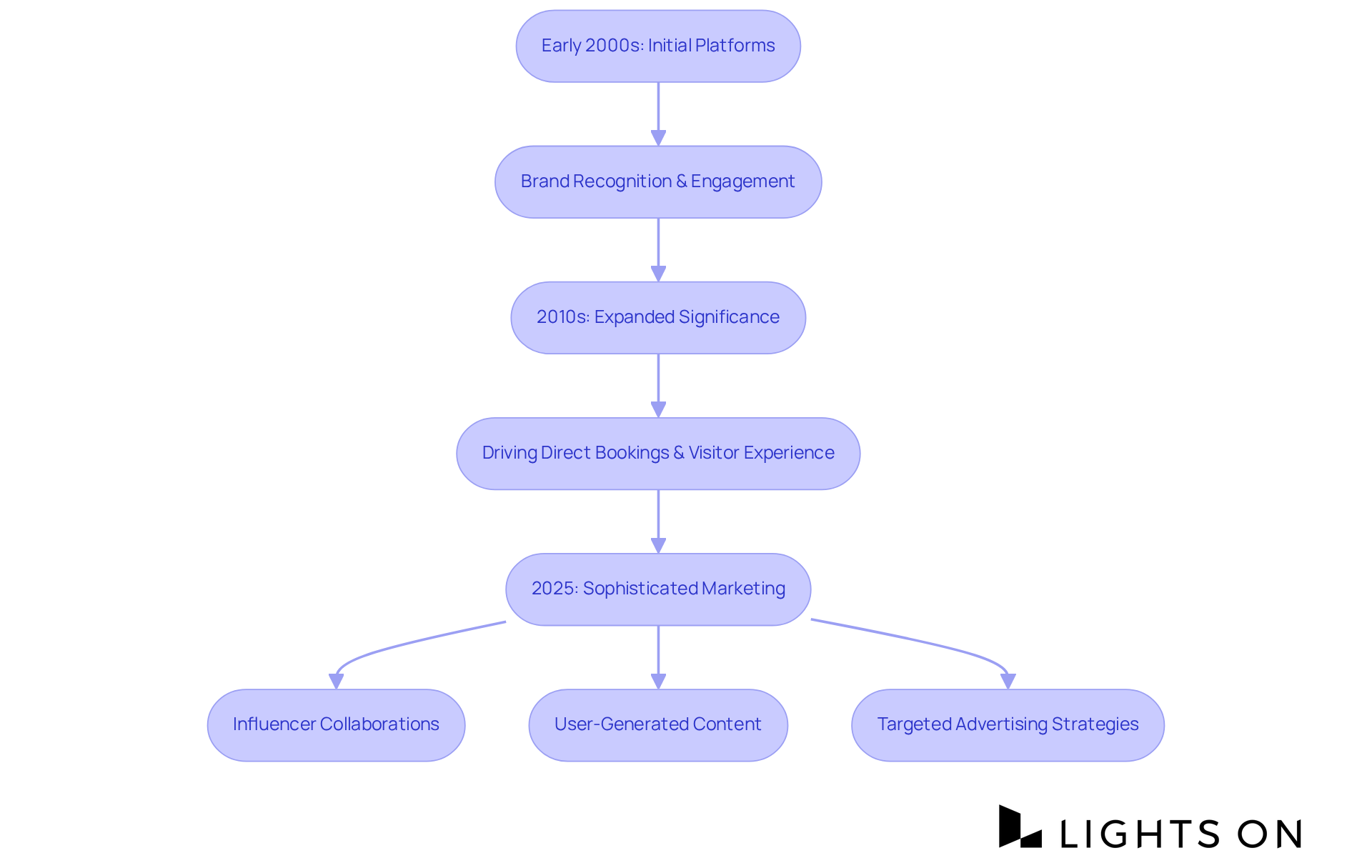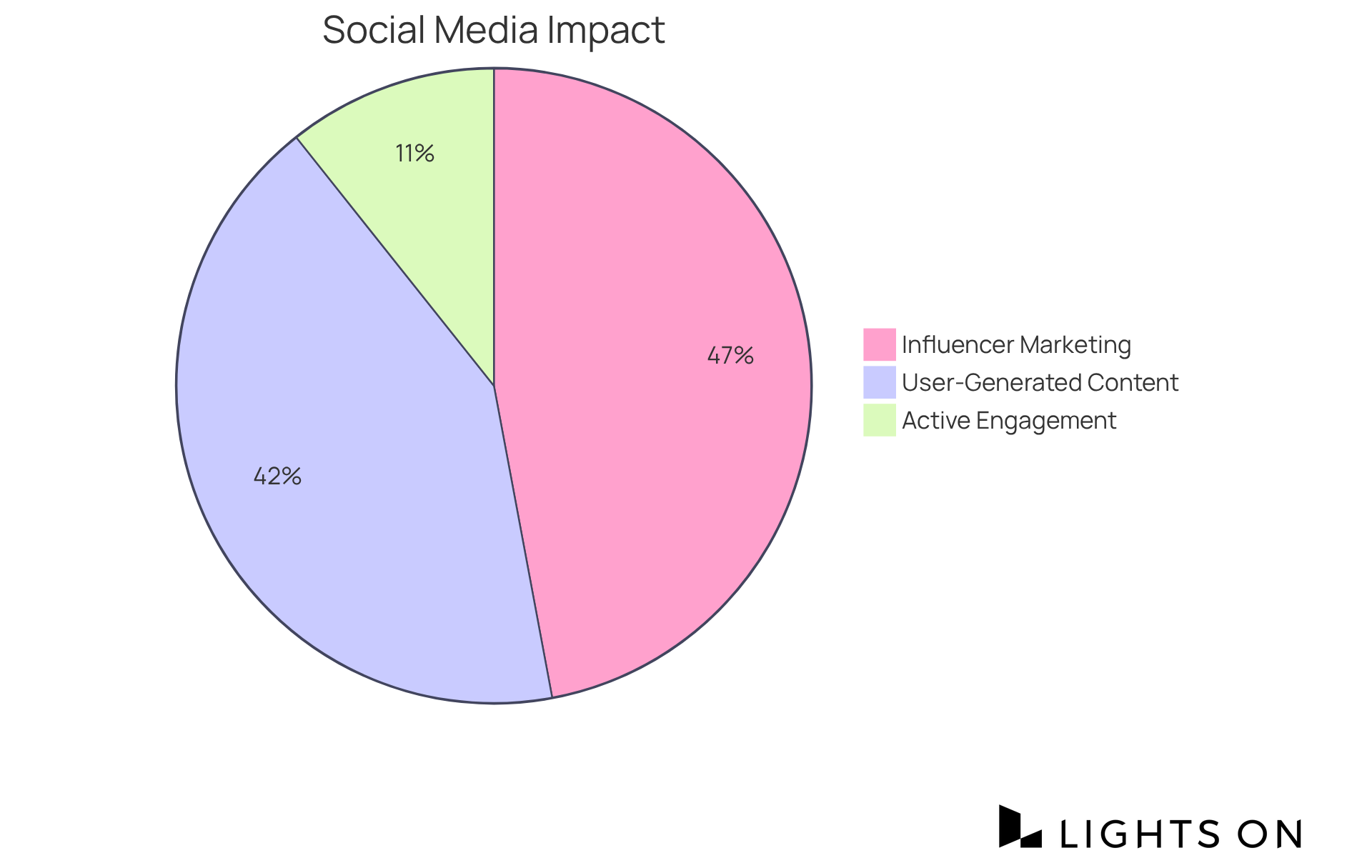The article underscores the critical role of social media as a strategic asset for hotels, enhancing brand visibility, engaging potential guests, and driving direct bookings. It outlines effective strategies, including:
These elements are essential for adapting to the dynamic digital landscape of hospitality marketing, providing hotel and restaurant owners with the insights needed to navigate their challenges successfully.
The digital landscape is undergoing a rapid transformation, and for hotels, social media has emerged as a critical tool for connecting with potential guests and enhancing brand visibility. As travelers increasingly turn to platforms like Instagram and TikTok for travel inspiration, hotels find themselves with a unique opportunity to showcase their offerings and engage with diverse audiences through authentic content. However, with the ever-evolving nature of social media, the pressing question is: how can hotels effectively navigate these platforms to not only attract visitors but also foster lasting relationships?
Social media for hotels represents a strategic opportunity to leverage platforms such as Facebook, Instagram, Twitter, and TikTok for engaging prospective guests, promoting services, and enhancing brand visibility. By 2025, online platforms are projected to emerge as a crucial marketing resource, with 35% of travelers relying on these channels for travel suggestions and reservations. This evolving digital landscape empowers accommodations to showcase their unique attributes, , and foster community involvement.
Effective strategies encompass:
Furthermore, integrating digital platform efforts with additional marketing tactics, such as email promotion and SEO, is essential for amplifying reach and impact. As accommodations increasingly recognize the pivotal role of social media for hotels in shaping visitor experiences, this acknowledgment reinforces their status as a fundamental component of modern hospitality marketing strategies.
Moreover, services like GuestCONNECT offer tailored online strategies that can enhance a property's web presence, while advancements in AI technology provide personalized interaction opportunities for visitors.

The development of in hospitality began in the early 2000s with platforms like Facebook and Twitter, which hotels first leveraged for brand recognition and customer engagement. As these platforms evolved, their significance expanded, transforming into powerful tools for driving direct bookings and enhancing visitor experiences.
By 2025, online platform marketing has matured into a sophisticated practice characterized by:
This transition mirrors a broader trend towards interactive and personalized marketing methods that resonate with today’s tech-savvy travelers. Notably, successful campaigns from Marriott Hotels and The Ritz-Carlton illustrate the power of engaging storytelling and authentic guest experiences in fostering brand loyalty and increasing bookings.
As the hospitality sector continues to embrace digital platforms, the integration of social media for hotels indicates a crucial role in shaping marketing strategies and enhancing operational efficiencies.

Effective strategies in social media for hotels are characterized by several essential elements that can significantly enhance your establishment's reach and engagement.
By concentrating on these essential traits, accommodations can develop effective social media tactics that not only improve their online visibility but also stimulate interaction and nurture enduring connections with visitors.

Social media for hotels profoundly influences accommodation performance and visitor engagement, emerging as a vital tool for enhancing visibility and fostering customer loyalty. Hotels that actively engage with visitors on platforms such as Instagram and Facebook typically witness elevated occupancy rates and improved satisfaction scores. Notably, brands that leverage user-generated content experience a significant boost in trust, with 79% of travelers affirming that peer content impacts their accommodation choices more than traditional advertisements.
Furthermore, online platforms act as immediate feedback mechanisms, enabling accommodations to swiftly address concerns and adapt services in response to visitor input. The rise of underscores this trend; 88% of consumers have made purchases influenced by online creators, highlighting the power of authentic recommendations in driving bookings.
As hotels increasingly acknowledge the significance of social media for hotels, they can leverage these platforms not only to enhance guest engagement but also to convert social interactions into tangible revenue growth.

Social media has emerged as an essential tool for hotels, offering a dynamic platform for engaging potential guests and enhancing brand visibility. As the hospitality industry evolves, the importance of leveraging social media strategies cannot be overstated. By 2025, these platforms are set to play a crucial role in shaping marketing approaches, allowing hotels to connect authentically with their audience and influence their travel decisions.
Key insights from the article highlight the significance of:
in crafting effective social media strategies. Hotels that prioritize high-quality content, user-generated material, and data-driven decision-making are better positioned to enhance guest interactions and drive bookings. As demonstrated by successful campaigns from leading brands, the integration of influencer marketing and targeted advertising can further amplify reach and foster brand loyalty.
In a landscape where travelers increasingly rely on social media for recommendations and insights, the call to action is clear: hotels must embrace these platforms as integral components of their marketing strategies. By doing so, they not only enhance their online presence but also cultivate lasting relationships with their guests, ultimately translating social media interactions into tangible business growth. The future of hospitality marketing lies in the effective utilization of social media, making it imperative for hotels to adapt and thrive in this digital age.
What is the significance of social media for hotels?
Social media for hotels represents a strategic opportunity to engage prospective guests, promote services, and enhance brand visibility through platforms like Facebook, Instagram, Twitter, and TikTok.
How are online platforms projected to influence travel decisions by 2025?
By 2025, it is projected that 35% of travelers will rely on online platforms for travel suggestions and reservations, making these channels crucial marketing resources.
What are effective strategies for hotels to utilize social media?
Effective strategies include creating high-quality, authentic content that resonates with target demographics, utilizing user-generated material, and maintaining a consistent posting schedule—three to five times weekly on Instagram and TikTok, and once or twice daily on Facebook and X.
How can hotels amplify their social media efforts?
Hotels can amplify their social media efforts by integrating digital platform strategies with additional marketing tactics such as email promotion and SEO.
Why is social media considered a fundamental component of modern hospitality marketing?
Social media is recognized as a fundamental component of modern hospitality marketing because it shapes visitor experiences and helps accommodations showcase their unique attributes and engage diverse audiences.
What services can help enhance a hotel's online presence?
Services like GuestCONNECT offer tailored online strategies that can enhance a property's web presence.
How does AI technology contribute to social media for hotels?
Advancements in AI technology provide personalized interaction opportunities for visitors, enhancing engagement and customer experience.
Transform your group booking strategies with Lights On and watch your occupancy soar.